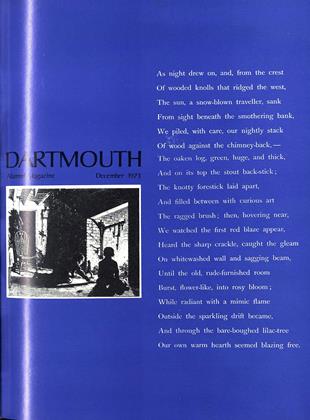Those fabled "sharp and misty mornings" were happily less sharp this fall than some, but the College anticipates "the crunch of feet on snow" with considerably diminished exuberance as authorities seek measures to cope with the energy crisis. As one of the largest non-industrial users of fuel oil in northern New England, Dartmouth faces a formidable task in reducing consumption by the 15 percent that seems a necessary minimum.
Business Manager Richard W. Olmsted '32 has presented a set of mind-boggling statistics in a memorandum to students and college personnel, outlining the austerity measures already undertaken and appealing for voluntary cooperation in conserving energy. An estimated 4.3 million gallons of fuel, he predicts, will be used this season to produce steam for 10,000 radiators controlled by 4,000 thermostats and to generate a significant portion of the electric power required to operate the College. The projected cost of heating oil for 1973-74 is $500,000, a hefty hike over last year's $300,000, even with reduced consumption.
The first move has been to turn the thermostats in all college buildings down to 65 degrees in the daytime, 55 at night. In classrooms, offices, and public areas other than those used regularly in the evening, the reduction occurs between 4 and 6 p.m.; dormitory temperatures are lowered from midnight until 7 a.m.
If the. clank of the steam radiators, dear to the memory of all Sons of Dartmouth, will be heard less often on the land, the campus will also be in unaccustomed gloom this winter. Floodlighting of Dartmouth Row and Baker Library will be reserved for only the most special of occasions, a maximum of once or twice a term. Corridor lighting has been turned off wherever feasible and general lighting reduced, in some cases by the removal of bulbs.
Residents in college housing have been asked to turn individually controlled thermostats up no higher than 65 degrees at any time and students and staff are requested to keep windows and ventilators closed except when absolutely necessary. The College has offered heavy plastic sheeting in lieu of storm windows to oc- cupants of college housing; tenants are expected to install it on first-floor windows, but Buildings and Grounds will take care of upper stories.
President Kemeny has announced that the start of winter term will be delayed six days and that college buildings will be essentially closed from December 21 to January 2, to conserve fuel. Lost class time will be made up on Saturdays.
The suggestion that the College community might revert on its own to Daylight Saving Time, possibly in conjunction with the Hitchcock Medical Center, poses complexities that border on the ludicrous Students would be starting classes a- " a.m. and trooping off to dinner at 4 pr by the clocks of the outside world of down town Hanover. Hospital patients would be eating supper shortly after their relatives at home finished lunch.
Professor Paul Zeller brings his choristers to order as the Men's and Women's GleeClubs make their debut as a mixed chorus in a Fall Houseparty Weekend concert.
Student firefighters have learned a lot since these undergraduates tried, with a notablelack of success, to douse the 1904 fire at Dartmouth Hall with snow.
 View Full Issue
View Full Issue
More From This Issue
-
 Feature
FeatureWHY COLLEGE ?
December 1973 -
 Feature
FeatureWatergate and the Press
December 1973 By H. WILLIAM SHURE -
 Feature
FeatureMiSSING IDOL:KOM AGAIN?
December 1973 By MICHAEL STUART '71 -
 Feature
FeaturePoet of Place
December 1973 By R.B.G. -
 Article
ArticleBig Green Teams
December 1973 By JACK DEGANGE -
 Article
ArticleMILLETT G. MORGAN
December 1973 By R.B.G.
Article
-
 Article
ArticleTHINGS YOU MAY NOT KNOW ABOUT THE IKE VISIT
June 1995 -
 Article
ArticleMasthead
March 1998 -
 Article
ArticleWith the D.O.C.
February 1955 By 808 LEOPOLD '55 -
 Article
ArticleTuck School
JANUARY 1965 By BOB KIMBALL T'48 -
 Article
ArticleCapital Campaign Tops Goal
JULY 1959 By J. Zimmerman '23 -
 Article
ArticleThayer School
APRIL 1964 By WILLIAM P. KIMBALL '29


